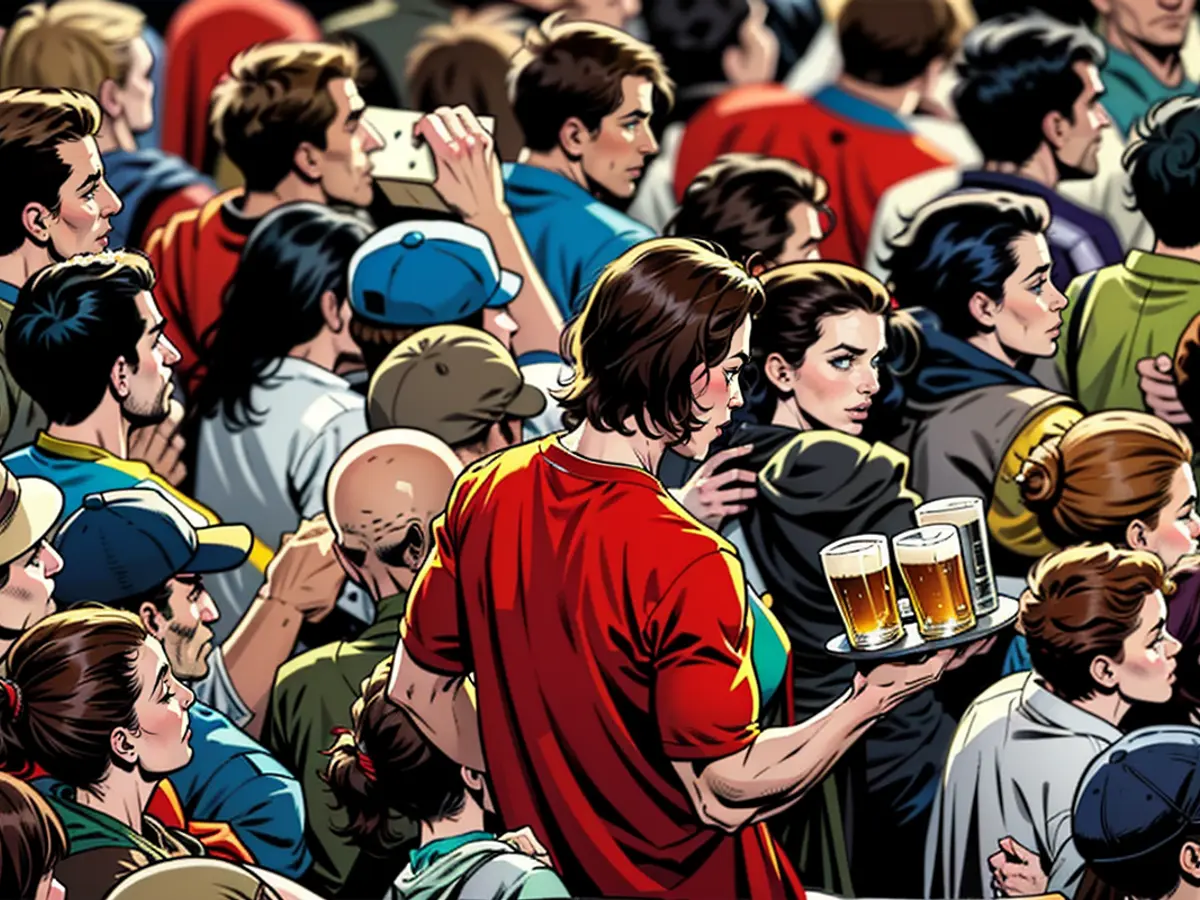Beer sales - The Football EM Effect is inflated for breweries
The Football European Championship has left long faces at Germany's Breweries. Companies had anticipated a strong demand surge as fans gathered to celebrate and drink deeply. However, it didn't turn out that way: "The Football-EM effect has flopped for the Breweries," says Veltins' General Proxy Michael Huber.
According to his company's estimation, which has a good market overview as an shareholder in a logistics company for supermarkets, only eight million hectoliters of beer were sold in Germany in June, which is slightly less than in May.
The decline is surprising, as people typically drink more Beer in June than in May. In general, the rule of thumb is: The warmer and sunnier the weather, the more beer is consumed. However, the rainy weather dampened the drinking mood.
Staying home instead of gathering in the "Rudel"
People didn't gather in large numbers for "Rudelgucking" (watching together) during the course of the tournament, but rather watched football at home alone and drank relatively little beer in comparison, says Huber. "That's different from when you invite the neighbors for a barbecue and drink beer." There's a consumption restraint and a tendency to save. The omnipresent dark themes of world politics sometimes prevented a carefree party atmosphere. "We've felt that."
The "Summer Fairy Tale" - the Football World Championship in Germany 2006 - was different, says Huber. Back then, the beer sales in June were reportedly around 11 million hectoliters, three million more than in June of this year.
In the gastronomes of some cities, more beer was indeed consumed at times, but these were local effects, says Huber. Breweries sell around one sixth of their beer in Germany to the gastronomy, the lion's share of their business comes from trade - and sales there reportedly declined according to Veltins' estimation.
Positive half-year figures from Veltins
Veltins also presented figures, according to which the family business sold around four percent more beer in the first half of 2024 than in the previous business year. The total output was reportedly around 1.7 million hectoliters. In June, however, Veltins also recorded a minus. Manager Huber only expects slight growth for the second half of the year.
The German Brewers' Association also spoke cautiously about the consequences of the Football-EM for the industry. "Unfortunately, the weather didn't play along as we had hoped," says Managing Director Holger Eichele. "The rollercoaster temperatures and the frequent storms made it difficult for many hosts to run their businesses, some garden parties were washed away." In addition, the beer industry is also feeling the consumption restraint, the mood to consume has deteriorated.
Other breweries also spoke out. "The German beer market remains under pressure," said a Radeberger spokesperson. "Even if it's too early for a definitive balance, the Football-EM in the area could not bring the sales impulses hoped for by the industry." The Federal Statistical Office will publish the sales figures for June and thus for the entire first half of the year in two weeks, these figures may be more precise than the Veltins estimation.
The Radeberger spokesperson looked at the overall market and stated that brewers were hoping for a summer that would still eventually come, as it could bring important sales impulses. A Krombacher spokesperson expressed satisfaction with the business development of his company in the first half of the year. Warsteiner declined to comment.
Generational Change at Veltins
Brewery Veltins employs 721 people, with the headquarters in Meschede-Grevenstein in the Hochsauerlandkreis (NRW). At the family-owned business, there is a handover in the management offices at the turn of the year. The company helm, Huber (75), is stepping down from the helm due to age, and the current sales manager Volker Kuhl (61) will then become the spokesperson for the management. The company owner Susanne Veltins (64) is also leaving the management and moving to the Veltins Advisory Board.
Her nephew Fabian Veltins (34) is already active in the company. He could become the managing director of the company in a few years. "It is my dream to one day take over Brewery Veltins," says the brewmaster, who gained experience before joining Veltins in Spain at another brewery. His aunt Susanne Veltins says: "I want to give him time to get to know all areas in peace."
- Despite the expectation of increased demand for beer during the European Football Championship, German breweries reported a decline in sales, with only eight million hectoliters of beer sold in June, according to Veltins' General Proxy Michael Huber.
- Huber attributes the decline in beer sales during the tournament to several factors, including less gathering for "Rudelgucking" and a tendency towards consumption restraint and savings among soccer fans.
- The rainy weather dampened the drinking mood, and the omnipresent dark themes of world politics sometimes prevented a carefree party atmosphere during the tournament, according to Huber.
- In comparison to the Football World Cup in Germany 2006, beer sales in June of this year were reportedly around three million hectoliters less, according to Huber.
- Other breweries, such as Radeberger and Krombacher, also reported a decline in sales during the tournament, with some hoping for better sales in the future as they await the official figures from the Federal Statistical Office.







